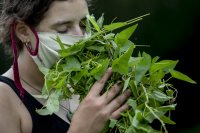
Short Term has started. And for 10 Bates students, Short Term is off to a great STA/RT.
Each year, the Short Term Action/Research Team, a program of the Harward Center for Community Partnerships, pairs students with local nonprofits for intensive five-week projects.
Working 20 hours a week in coordination with Harward Center staff, the students conduct extensive research — it could be creating and conducting a survey, interviewing people for an oral history, or designing a volunteer program.
“These students are mobilizing some pretty sophisticated skills and capacities.”
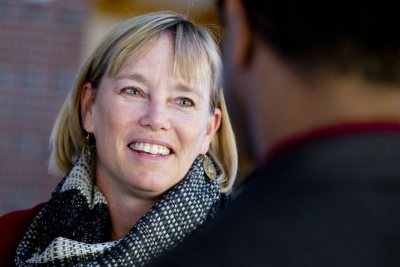
Darby Ray, director of the Harward Center for Community Partnerships. (Phyllis Graber Jensen/BatesCollege)
By the end of the term, the students will present a concrete, actionable product to the community partner, whether it’s a promotional video, a food security plan, or a subsidized housing database.
Each student brings specific research experience to the team, says Harward Center director Darby Ray.
Especially for the six seniors, the projects are a culmination of research-oriented skills they’ve learned at Bates, from making videos to data mining and GIS mapping to working across cultures.
“Even though they are only undergraduates, these students are mobilizing some pretty sophisticated skills and capacities for their off-campus projects and partners,” Ray says.
They are also diligent and fast-learning, said Healthy Homeworks president Amy Smith, who worked with a STA/RT member last year and is taking on another this year.
“To have somebody who’s bright and hardworking and willing to do anything, that goes a long way,” Smith said.
Here are this year’s projects.
Create a history of nursing at Central Maine Medical Center
The students: Courtney Porfido ’18 of Ramsey, N.J., and Matthew Glasgow ’19 of Salt Lake City
The partner: Central Maine Medical Center, located near Bates, serves Androscoggin County and is home to the Central Maine Heart and Vascular Institute and the Patrick Dempsey Center for Cancer Hope & Healing.
The project: Porfido and Glasgow will interview women, many of whom are in their 80s and 90s, who went to the Maine College of Health Professions, CMMC’s nursing/imaging school.
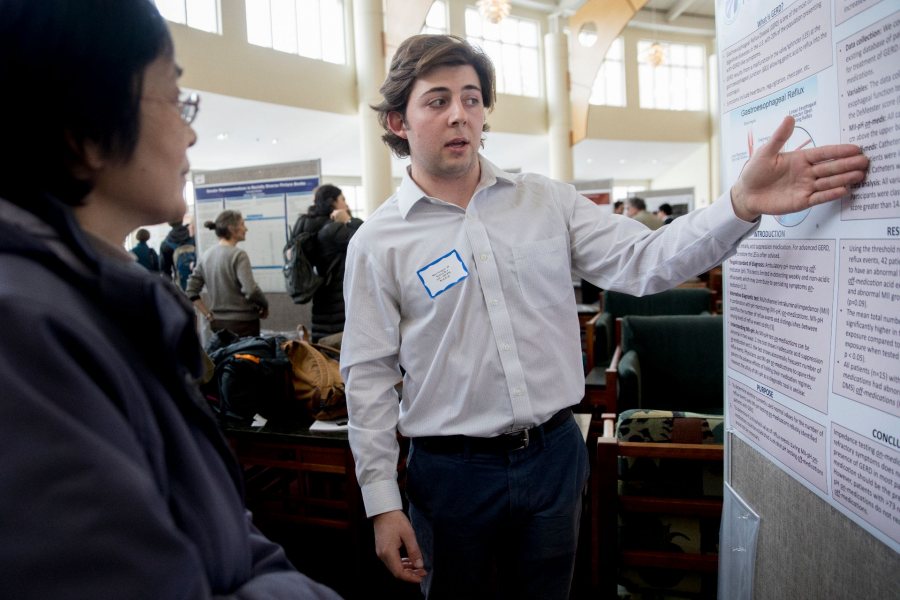
Matthew Glasgow ’19, who along with Courtney Porfido ’18 will help create a history of nursing at CMMC, talks about his research on reflux disease at the 2018 Mount David Summit. (Phyllis Graber Jensen/Bates College)
The product: Interview transcripts and documentary-style video that capture the experience, viewpoints, and memories of the nurses
Bring volunteers into a new women’s home
The student: Zsofia Duarte ’18 of Portland, Maine
The partner: The Center for Wisdom’s Women, a weekday drop-in center in Lewiston that offers women community-building and healing programs
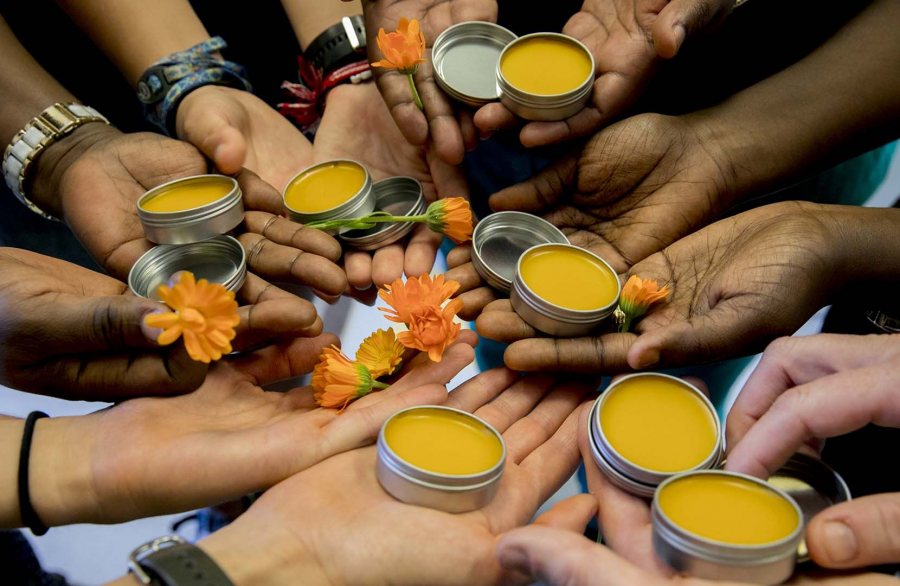
Women who attend or volunteer at the Center for Wisdom’s Women in Lewiston show off a calendula salve, a product of the center’s herbal business, Herban Works. This Short Term, Zsofia Duarte ’18 will help the Center create a volunteer program for a new residential facility. (Phyllis Graber Jensen/Bates College)
The project: Develop a volunteer program for Sophia’s House, a planned residential facility for survivors of trafficking, addiction, and incarceration
The product: A list of volunteer positions and a plan for recruitment and training, plus a written report, oral presentation, and video introduction to be used in volunteer training
Support prisoner education through data
The student: Hanna Condon ’18 of Key West, Fla.
The partner: College Guild, a Brunswick, Maine-based group that provides free correspondence courses to people who are incarcerated nationwide
The project: Create a survey to improve communication with volunteers, streamline office procedures, and provide data and stories for public relations, grants, and donations
The product: A survey tool and template, adaptable to those being surveyed, that helps staff understand the strengths and weaknesses of the program
Increase food access in public housing
The student: Sophia Thayer ’18 of West Boothbay Harbor, Maine
The partner: Lewiston Housing Authority, which operates Blake Street Towers, a public housing facility for senior citizens and younger people with disabilities
The project: Create a survey to examine food insecurity at Blake Street Towers and use the data to consider programs and partnerships with other community organizations that can enhance residents’ food security
The product: A food security plan for Blake Street Towers
Document housing conditions in the Tree Streets
The student: Zev Carter ’18 of Mattituck, N.Y.
The partner: Healthy Homeworks, an organization that seeks to improve urban housing
The project: Pull public records about buildings in the Tree Streets neighborhood and take pictures of residences
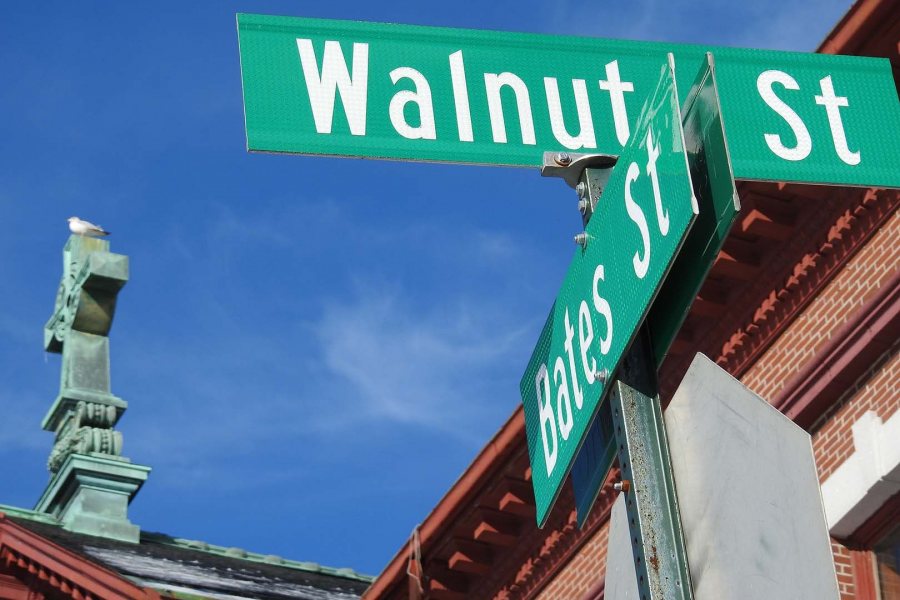
Healthy Homeworks, which works to improve the condition of urban residential buildings, is creating a database of housing in Lewiston’s Tree Streets neighborhood. (Jay Burns/Bates College)
The product: A more complete database that helps increase access to safe and affordable housing
Create a plan for digitizing a museum’s archives
The student: Allison Cormier ’19 of Deer Isle, Maine
The partner: Museum L-A, which tells the story of working people in Lewiston and Auburn
The project: Develop written policies, procedures, research summaries, and volunteer training to digitize the museum’s archival materials
The product: An executive summary of the work and copies of materials developed
Compile statewide subsidized-housing database
The student: Alexis Hudes ’20 of Owing Mills, Md.
The partner: Pine Tree Legal Assistance, which provides civil legal advocacy, information, and education to low-income people in Maine
The project: Find each subsidized housing project in Maine and list the location, owner, number of units, type of subsidy, and time limitations on the subsidy
The product: A written or electronic database of all subsidized housing in Maine which PTLA staff can use to help clients defend their rights
Promote a prisoner re-entry program
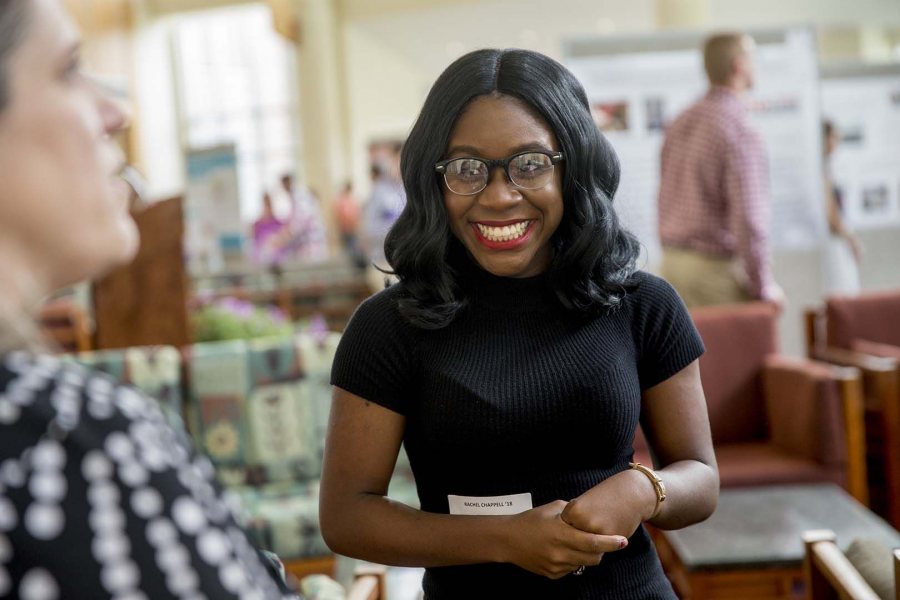
During a 2017 poster session, Rachel Chappell ’18 talks about her summer internship in photography and video. Chappell will create a video during Short Term to promote a prisoner re-entry program. (Phyllis Graber Jensen/Bates College)
The student: Rachel Chappell ’18 of Baltimore
The partner: Catholic Charities, whose REPAIR program focuses on prisoner re-entry and support
The project: Create a video that highlights REPAIR’s work, mission, vision, positive outcomes, and community benefits of supportive services for men and women re-entering communities from prison or jail
The product: A promotional tool that encourages community partners, volunteers, employers, landlords, and government agencies to join the REPAIR network and support fundraising
Create a social justice–oriented group for girls of color
The student: Angela Eustache ’20 of Lynn, Mass.
The partner: YWCA Central Maine, which works to eliminate racism and empower women
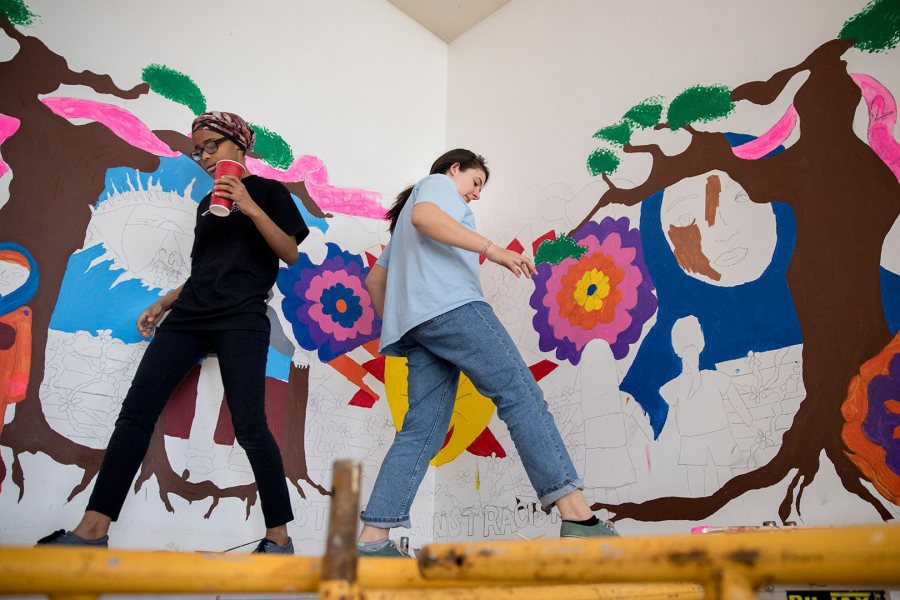
In 2017, Bates students teamed with Lewiston High School students to create a mural in the YWCA gym. The mural’s theme is “Women of Color Leading Change.” The project was guided by artist Carolina González Valencia of the Bates art and visual culture department. (Phyllis Graber Jensen/Bates College)
The project: Preliminary research, program and curriculum development, outreach to the Oakland-based Radical Monarchs program, and creation of a badge program
The product: A plan for a program for girls of color in grades 4–6 who attend the YWCA’s after-school program. The program would be led by women of color and help girls of color talk and learn about identity, social justice, activism, self-care, local and state history, and immigration.


